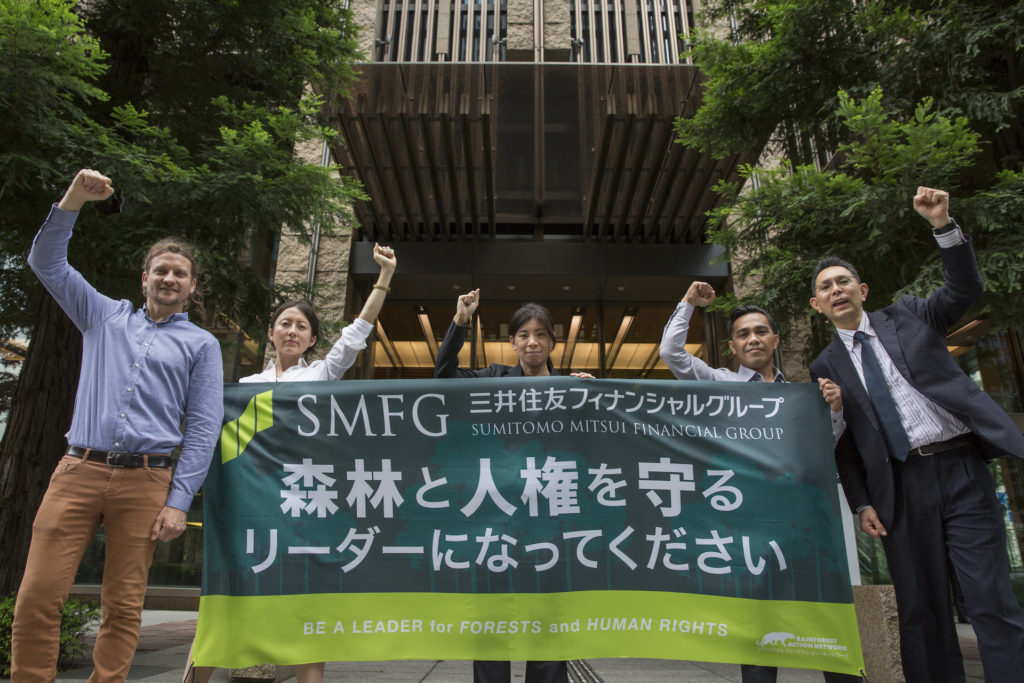NGO共同声明:三井住友フィナンシャル、石炭火力方針を改定もなお抜け穴〜パリ協定と整合せず〜(2021/5/12)
(English follows Japanese)
本日、三井住友フィナンシャルグループ(以下、SMBCグループ)が「気候変動問題への対策強化について」(注1)を発表し、石炭火力セクター方針の改定、グリーンファイナンス及びサステナビリティに資するファイナンス目標の改定などを明らかにしました。環境NGOは、脱炭素化に向けた一定の方針強化を歓迎するものの、パリ協定と整合的なビジネス戦略としてはなお課題が多いとの認識の下、下記の声明を発表しました。

石炭火力セクター方針の改定
「石炭火力発電所の新設および拡張案件への支援は行いません」と明記し、従来の超々臨界圧(USC)技術などの例外規定を取り除きました。しかし、方針には明記されていないものの、NGOとのやり取りにおいて、「CCUSやアンモニア・バイオマス混焼等、トランジションに資するものについては支援を検討可としている」と明らかにしました。これらの技術はいまだ実用化されておらず、2030年に温室効果ガスを半減するという、パリ協定1.5度目標に必要な中期目標の達成には何ら寄与しません。アンモニアや水素の混焼については、1-2割程度の混焼が目指されているところであり、全く解決策にはなりません。1.5度目標達成のためには、OECD諸国では2030年までに、世界全体では2040年までに石炭火力発電所は稼動を停止する必要があり、単にCCUSや混焼の技術を備えていることを例外扱いするのではなく、1.5度目標と整合的かどうかを厳格に判断する基準が必要です。
投融資ポートフォリオ排出量(Scope3)の把握
SMBCグループが「2050年カーボンニュートラルに向けた長期行動計画および具体的な施策を定めていく」とし、「投融資ポートフォリオのGHG排出量把握(Scope3)と中長期目標の設定」を行うと発表したことは、他の邦銀に先駆けた取り組みとして歓迎します。電力・石油・ガスセクターのScope3の把握を始めるとのことですが、石炭採掘を含めた化石燃料セクター全般およびパーム油を含む森林関連セクターのバリューチェーン全体に今後スコープを拡大していくことを期待します。また、三井住友DSアセットマネジメントなどの運用会社を含めたグループ全体での取り組みが重要です。
中長期目標は設定せず
一方で、欧米の銀行が投融資ポートフォリオの排出量ネットゼロに相次いでコミットしていることと比べて(注2)、同グループの今次改定が「今後の目標設定」に留まったことは懸念されます。昨年同グループが定めた「2040年度に石炭火力発電向けプロジェクトファイナンスの残高をゼロにする」という目標は、パリ協定に整合するために、石炭火力セクターのコーポレートファイナンスにも適用を拡大し、より早期に実現されなければなりません。また、石油・ガス、およびパーム油を含む森林関連セクターに関する改定が何ら行われなかったことは大きな懸念です。これらのセクターも含め、パリ協定と整合する具体的な指標と中長期目標の速やかな設定が求められます。
<各団体からのコメント>
国際環境NGO 350.org Japan代表の横山隆美は「気候危機の緊急性に比べて、今般のSMBCグループの方針改定は遅々としていると言わざるを得ません。1.5度目標を守るためには、科学の要請に基づいて早期に脱石炭・脱化石燃料を実現する必要があります。現状を見て積み上げるのではなく、あるべき姿からバックキャスティングを行うための強力なリーダーシップが求められます」と述べました。
気候ネットワークの国際ディレクター平田仁子は「今回の方針強化は、パリ協定の下での行動強化の必要性を認識したものと受け止めたいが、SMBCグループのファイナンスがなおパリ協定に整合するものとは評価できません。特に石炭火力セクターにおいて、明示的に書かれていないものの、CCUSやアンモニア・水素混焼技術を容認していることにより、石炭火力の延命を支援することにつながることが大いに懸念されます」と述べています。
「環境・持続社会」研究センター(JACSES)、プログラム・ディレクターの田辺有輝は、「石炭火力発電事業への支援停止について、SMBCグループはNGOとのやり取りにおいて、CCUSやアンモニア・バイオマス混焼等を例外としていることを明らかにしましたが、公開されている方針の文言から、このような例外規定があることを想定することは不可能です。このような例外規定があるのであれば、あらかじめ方針で明示するべきです」と述べています。
レインフォレスト・アクション・ネットワーク(RAN)、責任ある金融シニア・キャンペーナーのハナ・ハイネケンは、「SMBCグループは、ファイナンスによる温室効果ガス排出量の算定を約束したことで、他の邦銀から一歩先に踏み出しました。しかしSMBCの気候フットプリントの重要性を考えると、同グループが化石燃料全般、森林破壊および泥炭地破壊への資金提供停止を含め、1.5度目標のタイムラインに基づいて排出量ゼロを明確に誓約しない限り、真剣に受け止めることはできません」と指摘しました。
注1)https://www.smfg.co.jp/news/j110309_01.html
注2)https://www.unepfi.org/net-zero-banking/
<本件に関するお問い合わせ>
国際環境NGO 350.org Japan 担当:渡辺 japan@350.org
気候ネットワーク 担当:平田 khirata@kikoent.org
「環境・持続社会」研究センター(JACSES) 担当:田辺 tanabe@jacses.org
レインフォレスト・アクションネットワーク(RAN) 担当:関本 yuki.sekimoto@ran.org
*5月13日追記:5月12日配信内容に以下を追加しました。
●RANも13日に賛同団体として連名し、ハイネケンのコメントを追加しました。
●「森林セクター」としていましたが「パーム油を含む森林関連セクター」に変更しました。
Loopholes Remain in SMBC Group’s New Coal Policy
Japan’s Megabank Still Not Aligned with the Paris Agreement
Today, Sumitomo Mitsui Financial Group (hereinafter SMBC Group) published a statement entitled “Reinforcing Efforts against Climate Change,” (1) announcing revisions to its coal-fired power sector policy as well as updated targets for green and sustainability finance. Environmental NGOs welcomed the strengthening of policies toward decarbonization, but issued the following statement, recognizing that there are still many challenges to be addressed for the SMBC Group to set a business strategy consistent with the Paris Agreement.
Coal-fired Power Sector Policy
In the new policy, the Group stated that “Support for newly planned coal-fired power plants and the expansion of existing plants are not provided” and removed exceptions such as ultra-supercritical pressure (USC) technology from the previous policy. However, in an exchange with NGOs, the Group clarified that under the new policy, “support can be considered when (projects) will contribute to transition to decarbonization, such as CCUS and ammonia / biomass mixed combustion.” These technologies have not yet been put to practical use and will not contribute to the achievement of the medium-term goal required for the 1.5 degrees Celsius goal of the Paris Agreement, which is to halve greenhouse gases in 2030. Regarding the mixed combustion of ammonia and hydrogen, about 10-20% of the mixed combustion is aimed at, and it is not a solution at all. Coal-fired power plants need to be shut down by 2030 in OECD countries and by 2040 globally to reach the 1.5 degrees target. Instead of treating CCUS and mixed combustion technology as exceptions, the Group needs to set rigorous criteria to determine whether their clients’ businesses are consistent with the 1.5 degrees goal.
Measurement of Loan/Investment Portfolio GHG Emissions (Scope 3)
The SMBC Group announced that it will “establish a long-term action plan to contribute to a carbon neutral society by 2050 and detailed initiatives” and that it will “obtain a clear understanding of the GHG emissions generated by its loan/investment portfolio (Scope3) and set medium- to long-term targets regarding those emissions.” We welcome this as an initiative that is more progressive than other Japanese banks. The Group explains it will start with Scope 3 of power, oil and gas sectors. We urge the Group to expand the scope to the entire value chain of the fossil fuel sector including coal mining, and the forest sector including palm oil. In addition, it is important to include asset management companies such as Sumitomo Mitsui DS Asset Management and work on it as an entire group.
No Medium-To Long-Term Goal Setting
On the other hand, compared to the recent international trend that European and US banks are committing to net zero emissions in their investment and loan portfolios (2), it is a concern that the Group’s has only committed to “future target setting” of such emissions. The goal set by the Group last year to reduce its credit balance of project finance related to coal-fired power generation to zero by 2040 needs to be realized earlier and be expanded to corporate finance in the coal-fired sector in order to be consistent with the Paris Agreement. There is also great concern that no revisions have been made to the oil and gas and forest sectors. Including these sectors, it is necessary to promptly set specific indicators and medium- to long-term goals that are consistent with the Paris Agreement.
Comments by NGOs
Eri Watanabe, Japan Finance Campaigner for 350.org said “Concerning the urgency of the climate crisis, the revision of the SMBC Group’s policy is much slower. In order to meet the 1.5 degrees target, it is necessary to realize the urgent phase-out of coal and fossil fuel sectors as climate science demands. Strong leadership is required to achieve the target by backcasting, rather than by building up on the current situation.”
Kimiko Hirata, International Director at Kiko Network stated “Understanding that the SMBC Group’s recent revision is due to the recognition of the need to strengthen actions under the Paris Agreement, we cannot evaluate that the Group’s finance is consistent with the Paris Agreement. Especially in the coal-fired power sector, although not explicitly stated, there is great concern that allowing CCUS and ammonia/hydrogen mixed combustion technologies will help extend the life of coal-fired power.”
Yuki Tanabe, Program Director of JACSES said “Regarding the suspension of support for coal-fired power generation projects, the SMBC Group has made it clear that CCUS and ammonia/biomass mixed combustion are exceptions in the conversation with NGOs. It is impossible to assume that there are such exceptions from the announced policy text. If there is such an exception, it should be clearly stated in the policy to avoid misleading understanding by stakeholders.”
Hana Heineken, Senior Responsible Finance Campaigner at RAN said, “SMBC Group has stepped ahead of the other Japanese banks by committing to measure its financed emissions. But given its significant climate footprint, there is no way we can take them seriously without a clear commitment to zero out emissions based on a 1.5 degree timeline, including by stopping the financing of fossil fuels, deforestation, and peat destruction.”
(1) https://www.smfg.co.jp/news_e/e110168_01.html
(2) https://www.smfg.co.jp/news_e/e110168_01.html
Contacts
Eri Watanabe (350.org Japan) Email: japan@350.org
Kimiko Hirata (Kiko Network) Email: khirata@kikoent.org
Yuki Tanabe (JACSES) Email: tanabe@jacses.org
Yuki Sekimoto (RAN) Email: yuki.sekimoto@ran.org
